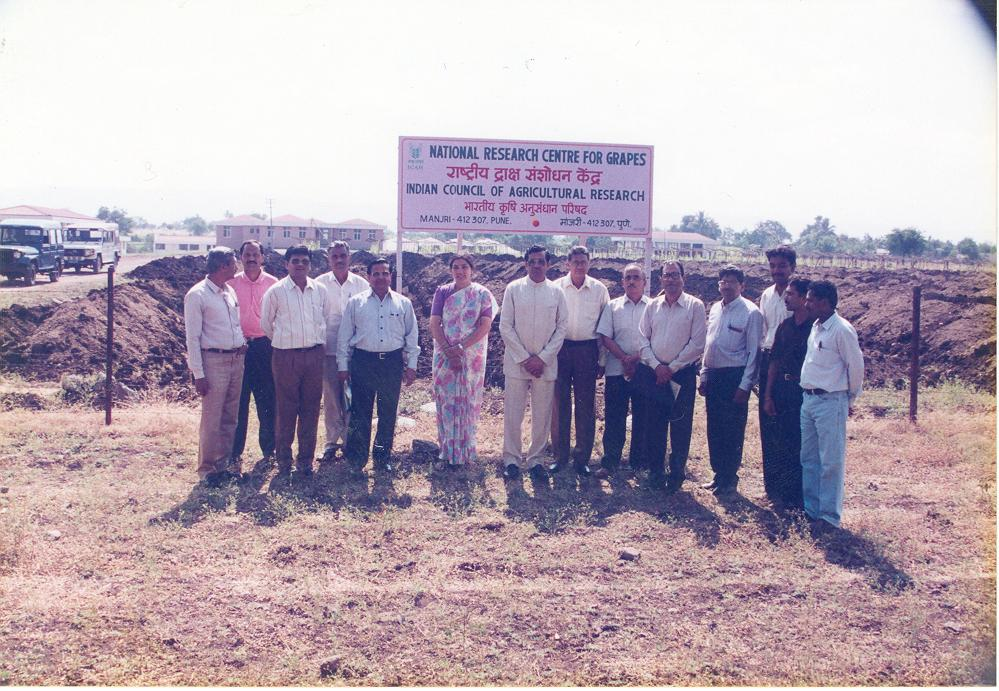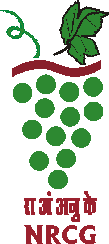Mandate
The ICAR-National Research Centre for Grapes under Indian Council of Agricultural Research (ICAR), New Delhi was established on 18th January 1997 at Manjari, Pune.The mandate of the institute is:
- Strategic and applied research on safe grape production and productivity.
- Transfer of technology and capacity building of stakeholders for enhanced and sustained production of grapes.
- National Referral Laboratory for Food Safety and Pesticide residue in fruits.
Brief history of the Centre
Genesis
The grape growers of India were among the first to form a cohesive non-political, non-racial and non-religious group for sharing the knowledge and for garnering technical and administrative support for the grape industry in all facets of grape production, processing and marketing. Owing to several problems faced by grape growers with respect to grape production and to get their problems solved, the group approached the Indian Council of Agricultural Research to establish a dedicated research unit for working on grapes. Thus after due deliberation on the research needs of grape growers and the grape industry and also to address the future challenges and opportunities, the Indian Council of Agricultural Research approved the establishment of National Research Centre for Grapes vide sanction letter No.1 (2)/92-PI&M (Part-III) dated 16 September, 1993.
The then Director General of ICAR, Dr. R. S. Paroda and Deputy Director General of Horticultural Division, Dr. K. L. Chadha, played a very important role in the establishment of the Centre. They were ably assisted by Dr. S.P. Ghosh, then Assistant Director General of Horticultural Division and Dr. S. D. Shikhamany, Head, Division of Fruit Crops, I.I.H.R.,Bangalore, Officer on Special Duty, Indian Institute of Horticultural Research, Bangalore.
Selecting the location of the Centre
After due consideration of the soil profile characteristics, climatic factors, proximity to other research and development institutes and nearness to commercial vineyards, of the land offered by the states of Maharashtra, Karnataka and Andhra Pradesh; the ICAR selected the land offered by the Government of Maharashtra at Manjri on Pune-Solapur Road for establishment of the Centre.
Acquiring the land
The official decision to hand over the land by the Vice-Chancellor; MPKV to DG, ICAR was announced on 18th January 1997. However, it was later realized that the selected piece of land belonged to the Maharashtra State forest department even though there was no forest cover. Mahatma Phule Krishi Vidyapeeth (MPKV), Rahuri, facilitated the lease by handing over an equal area of land near Nagpur to the Forest department for which, the ICAR bore the cost of afforestation. The ICAR and NRC for Grapes will be always indebted to the grape growers, State Department of Agriculture and MPKV, Rahuri for their help for its initial establishment. The actual land measuring 46.78 ha was leased to ICAR-NRC Grapes on 29th January, 1998. To commemorate its birth, ICAR-NRC Grapes, Pune celebrates 18th of January as its “Foundation Day”.

Establishment
The Centre initially started functioning from the newly constructed R & D premises of the Maharashtra State Grape Growers’ Association (MSGGA) which is adjoining to the site selected and also utilized the newly established vineyards of MSGGA for carrying out small scale research experiments.
Director and Staff
Dr. S.D. Shikhamany, Principal Scientist, Division of Fruit Crops, I.I.H.R., Bangalore, was appointed as the Officer on Special Duty on 22nd Oct, 1996. During December 1996, the first batch of scientific staff was posted to the Centre.
In February 1997, recruitment was made for administrative and technical staff. On 25th February, 1997 Dr. S.D. Shikhamany joined as regular Director of the Centre. He completed his tenure on 25.07.2002 and Dr. P. G. Adsule took over the reins, first as Director (acting), and then as regular Director on 26.04.2005.
Formulation of Research Plan
In May 1997, the first Staff Research Council meeting was conducted under the Chairmanship of Dr. S. P. Ghosh, DDG (Hort.), ICAR and short-term Research Projects were formulated to tackle some of the then major problems faced by the grape industry. A group discussion was arranged with representatives of Maharashtra State Grape Growers Association; officials of State Horticulture Department; Scientists of MPKV, Rahuri and Agharkar Research Institute, Pune; to identify and prioritize the research needs of the grape industry.
The first Research Advisory Committee meeting was held in 1998 under chairmanship of Dr. J.C. Bakhshi, Ex-Vice Chancellor, RAU, Bihar, with the Dr. U.V. Sulladhmath, Ex-Prof. of Horticulture, UAS, Bangalore, Dr. R. Jayarajan, Ex-Prof. of Plant Pathology, TNAU, Coimbatore, Sh. C. Venkata Reddy, Sh. K. Nageshwara Rao and Sh. V.D. Patil, progressive grape growers from A.P. and Karnataka helped in guiding the research plan. Dr. Indu S. Sawant was the Member Secretary of this committee. Planting was done in five acre area to raise experimental plots, while need based research was carried out in growers’ vineyards.
Important milestones in the Centre’s growth
- The construction of the administrative-cum-laboratory building was completed in 2000. Equipments were purchased to initiate research activities. Experimental vineyards were planted to cover most of the area and irrigation facilities were augmented by adding borewells and lift irrigation facility from nearby canal was completed in XI Plan. Due to severe scarcity of water and bad quality of water from the available water resources experimental vineyards faced severe water and salinity stress. To tackle this problem, canal water was brought during the 11th plan.
- Water storage tanks have been built. The first Perspective Plan of ICAR-NRC Grapes, Vision-2020 was published during the year 1997-98 and subsequently Vision-2030 published in 2011 and is now under revision.
- The Centre organized a National Dialogue on Sustaining the Productivity of Grapes under Adverse Situations in collaboration with The Grape Growers Federation of India on June 7 and 8th 1999, at Pune. More than 300 eminent scientists and progressive grape growers participated in the dialogue.
- Grape field day: The Centre organized a ‘National Level Grape Day’ on 20th February 2002 for 369 grape growers from Maharashtra, Andhra Pradesh, Karnataka and Tamil Nadu. The growers could see more than 300 coloured / green, seeded / seedless table grape, juice and wine varieties in fruiting. Farmers were familiarised with the latest technologies in the areas of growth regulators, fertigation, water management, disease forecasting, biological control of post-harvest decay during the field visit. An Open House Discussion on various issues of grape cultivation was also arranged to know the problems faced by the grape growers and give the solutions
- Pesticide residue monitoring program (RMP) in table grapes for export to the European Union was started in 2003-04 season in response to the rapid alerts issued against Indian table grapes in Europe in 2003. The program was initiated to establish complete traceability of grapes for export to the EU countries from farm to consumer levels through a web-based residue monitoring system viz. GRAPENET, declaring ICAR-NRC for Grapes as the National Referral Laboratory (NRL). ICAR has recognized this Centre as the National Referral Laboratory for all fruits and vegetables vide F. No. 5-50/2009-Hort-I dated 21.01.2010.
- An International Symposium on Grape Production and Processing was organized during 6th to 11th February 2006 at Baramati. Main objectives of this international symposium were providing a platform for interaction between the grape growers and the scientists for resolving the problems in production and processing of grapes and creating awareness about new technologies and innovations in viticulture. The delegates from Australia, Brazil, China, US and South Africa were also participated in this event other than delegates from different states of our country. The event was successfully organized with the help of Grape Growers’ Federation of India, Ministry of Agriculture (GOI), Ministry of Agriculture (Government of Maharashtra) and International Society of Horticulture Science.
- Since its inception, the Centre has also been strengthened by acquiring high-end equipments for conducting basic and applied research and few posts have been provided.

